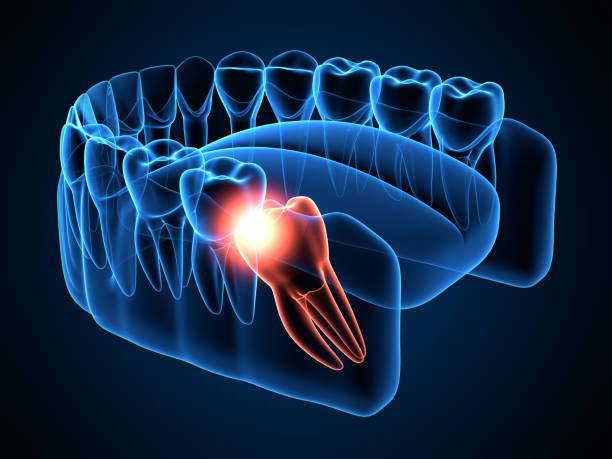Wisdom Teeth
Wisdom Teeth
Wisdom teeth are the third molars located at the back of your mouth, and they usually develop in early adulthood.
However, many people experience issues with their wisdom teeth due to a lack of space in their mouths or their wisdom teeth growing in at odd angles.
In such cases, wisdom teeth can cause pain, swelling, infection, and even damage to surrounding teeth.
If you’re experiencing any discomfort related to your wisdom teeth, it’s crucial to visit your dentist to see if you need wisdom teeth removal.
At Laxmi dental care, we offer advanced wisdom teeth treatment (Removal of wisdom tooth using PIEZOTOME Equipment) to ensure you get the best possible care.
Piezotome:
A specialized dental instrument that utilizes ultrasonic vibrations for precise and controlled bone cutting during surgical procedures. It is commonly used in oral and maxillofacial surgeries, including tooth extractions, ridge augmentation, and sinus lifts, offering improved surgical efficiency, minimal trauma to surrounding tissues, and enhanced patient comfort. The Piezotome’s oscillating tip allows for selective bone cutting while preserving soft tissues and nerves.
Symptoms indicating you need wisdom teeth treatment:
Symptoms indicating you need wisdom teeth treatment:
Some signs that you might need wisdom teeth treatment include:
- Pain in the back of your mouth, particularly near the molars.
- Red or swollen gums
- Gum infections
- Jaw stiffness or difficulty opening your mouth.
- Bad breath or an unpleasant taste in your mouth
- Crowding or shifting of your teeth
- Cysts in your jawbone
- Cavities or decay in your wisdom teeth

HOW ARE WISDOM TEETH REMOVED?
The relative ease at which your dentist or oral surgeon can extract your wisdom teeth depends on their position and stage of development.
Your oral health care provider will be able to give you an idea of what to expect during your pre-extraction exam.
A wisdom tooth that is fully erupted through the gum can be extracted as easily as any other tooth. However, a wisdom tooth that is underneath the gums and embedded in the jawbone will require an incision into the gums and then removal of the portion of bone that lies over the tooth.
Often, for a tooth in this situation, the tooth will be extracted in small sections rather than removed in one piece to minimize the amount of bone that needs to be removed to get the tooth out.
Wisdom teeth extraction procedure:
Wisdom teeth extraction is a relatively straightforward procedure, and it can usually be performed under local anesthesia or sedation.
The dentist will make an incision in your gums to expose the tooth and bone. They may need to remove some bone around the tooth to access it.
Then, they’ll loosen the tooth and remove it from its socket. Finally, they’ll stitch up the wound and place gauze to stop any bleeding.

Why do we have wisdom teeth?
Researchers believe that wisdom teeth were necessary for our ancestors, as their diet mostly consisted of hard nuts, crunchy leaves and uncooked meat. Today, however, we eat more cooked food and use forks and knives to cut our food up into smaller pieces.
As a result, wisdom teeth are widely regarded as vestigial structures (parts of the human body that have become unnecessary).
Wisdom teeth, also known as third molars, are the last set of teeth to develop in the back of the mouth.
While some people have enough room in their jaw to accommodate them, others may experience issues like impacted wisdom teeth, which can cause pain, swelling, and infection.
In such cases, it is recommended to remove the wisdom teeth.

Here are some advantages of wisdom teeth removal:
Prevents overcrowding: Wisdom teeth can cause overcrowding of teeth, leading to misalignment, which can cause various dental problems.
Removing them can prevent overcrowding and help maintain the proper alignment of your teeth.
- Prevents infection: Wisdom teeth can be difficult to clean, and as a result, food particles and bacteria can get trapped in the gums, leading to infection.
By removing the wisdom teeth, you can reduce the risk of developing gum disease, abscesses, and other infections. - Reduces risk of cavities: Wisdom teeth can also increase the risk of developing cavities, especially if they are partially erupted, making it difficult to clean them properly. By removing them, you can reduce the risk of developing cavities.
- Improves oral hygiene: Removing wisdom teeth can make it easier to brush and floss your teeth, leading to better oral hygiene and overall dental health.
- Reduces risk of oral cancer: Wisdom teeth can sometimes lead to cysts or tumors, which can increase the risk of oral cancer.
By removing them, you can reduce the risk of developing these conditions.
It is important to consult with a dentist to determine whether you need to have your wisdom teeth removed and to discuss the best treatment options for your specific case.
If you’re experiencing any pain or discomfort related to your wisdom teeth, it’s essential to visit your dentist to see if you need wisdom teeth treatment.
At Laxmi dental care, we offer advanced wisdom teeth treatment to ensure you get the best possible care.
Our experienced dentists and state-of-the-art technology ensure that your procedure is safe, efficient, and comfortable.
